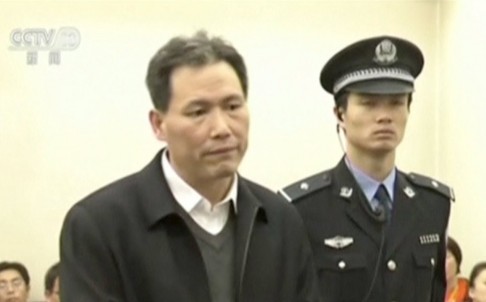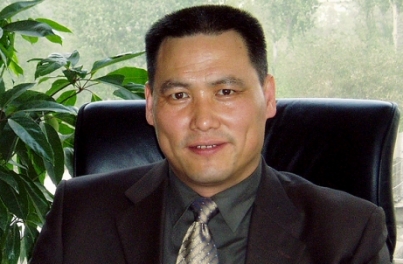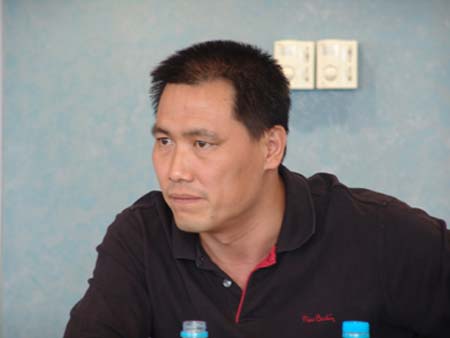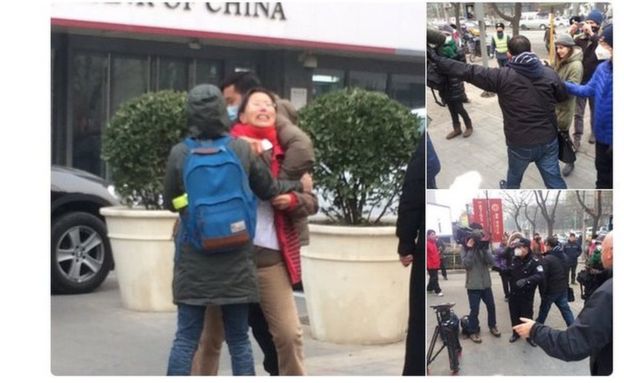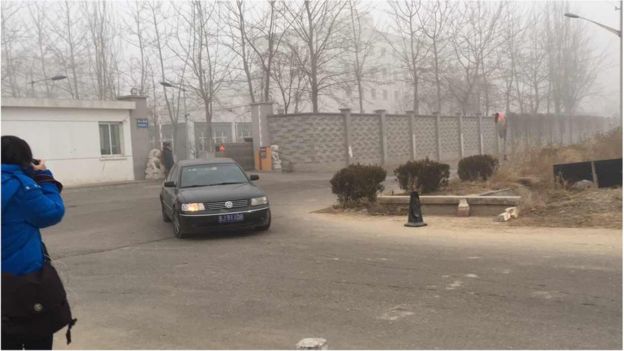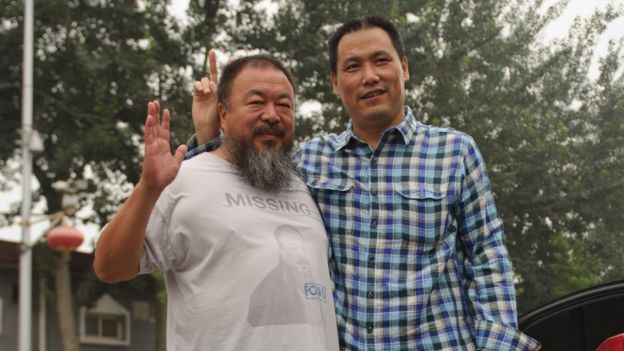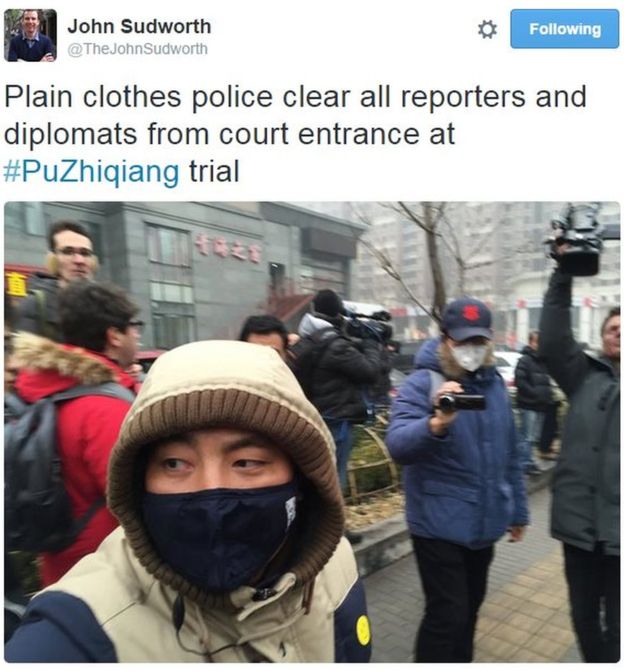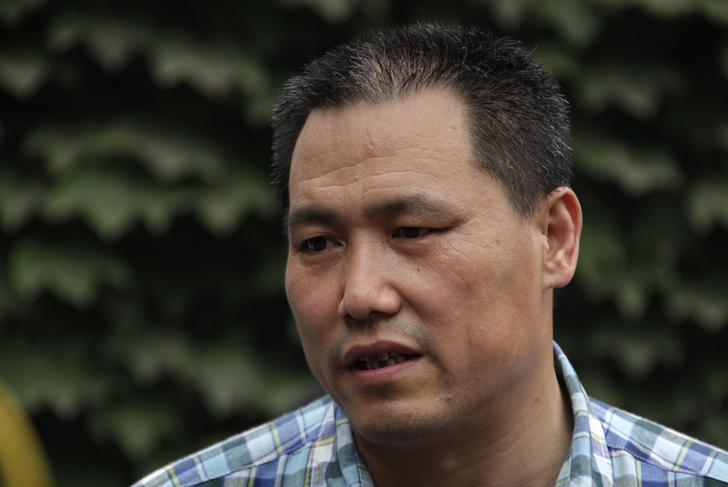By MICHAEL FORSYTHEJAN. 4, 2016
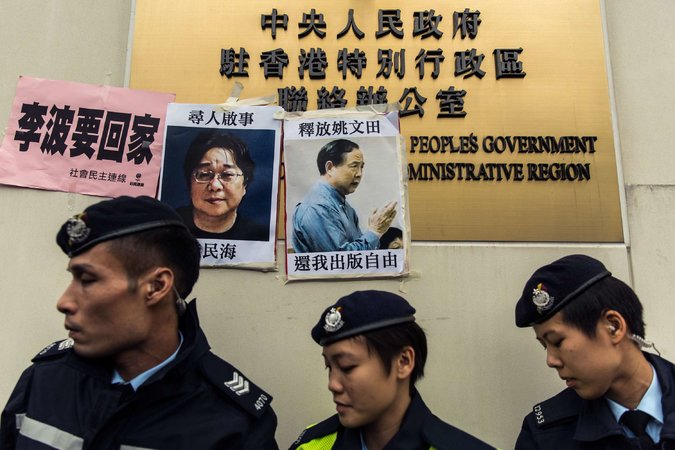
Posters of Gui Minhai, left, who is missing, and Yiu Mantin, a publisher jailed in 2014, at China’s liaison office in Hong Kong. Credit Anthony Wallace/Agence France-Presse — Getty Images
HONG KONG — The recent disappearance of five men tied to a publisher of provocative books about China’s top leaders has alarmed many people in this semiautonomous city, some who fear that the historic agreement guaranteeing the former British colony its separate government and legal system may have been dealt a severe blow.
In the worst-case scenario being speculated about, the five were all kidnapped by emissaries of Beijing and are being held in mainland China, to suffocate their voices and ferret out their Chinese sources.
On Wednesday, Lee Bo, an editor at the publishing house, Mighty Current Media, whose wife is one of its three owners, became the latest to vanish. He was last seen that day leaving a warehouse here.
On Saturday morning, he called his wife, Choi Ka Ping, from Shenzhen, across the border in the mainland, saying he was assisting in an investigation, according to Bei Ling, a writer based in the United States who has been following the case and who talked to Ms. Choi.
Mr. Lee’s disappearance came after that of four other men tied to Mighty Current and a bookstore it owns in Hong Kong, all of whom vanished in October. One, the co-owner Gui Minhai, a Swedish citizen, was last seen at his home at a resort in Thailand; the third co-owner, Lu Bo, vanished when he was in Shenzhen.
Two employees, Zhang Zhiping and Lin Rongji, were also last seen in southern China in October, according to Mr. Bei, local news media reports in Hong Kong and statements from human rights organizations.
The cases, which all appear to be related, have given rise to myriad theories. Mighty Current has written, published and marketed books highly critical of Chinese politicians, covering topics such as the sex lives of top leaders and corruption. The titles are banned in the mainland, where the news media and the publishing industry are tightly controlled by the governing Communist Party.
But in Hong Kong, where a broad range of civil liberties was guaranteed to last a half-century by the agreement that paved the way for Britain to return its former crown colony to China in 1997, publishing such books is not only legal but it is also a thriving business catering to visitors from the mainland. While there is no proof that the five were spirited away by the Chinese authorities, the nature of the books they sold has led many to suspect that the continuing crackdown on civil society in mainland China is spreading into Hong Kong and has prompted the Chinese authorities to illegally apprehend Mr. Lee, a native of the city.
“It is very concerning for most Hong Kong people because this sort of stuff is just not supposed to happen in Hong Kong,” Dennis Kwok, a prominent lawyer and a member of the Hong Kong Legislative Council, said by telephone.
“If it is confirmed that officials are involved, that would make the case even worse.”
Hong Kong’s top official, Leung Chun-ying, told reporters on Monday that the police were investigating the disappearances, adding that only Hong Kong officials have the authority to enforce the law in the city.
Mr. Leung and other officials have said there is not enough known to point a finger at anyone who may have been involved in what may have been abductions. The city’s police said that there was no record of Mr. Lee leaving Hong Kong, according to a report in the city’s largest-circulation English-language newspaper, The South China Morning Post.
Hong Kong operates as a semi-independent region with its own form of government and a legal system inherited from Britain under a framework called “one country, two systems.” And although it has made extradition and legal cooperation agreements with many countries, including the United States, in the more than 18 years since its return to Chinese sovereignty, there has been no such agreement signed with the mainland, said Simon Young, a law professor at the University of Hong Kong.
“This has been one of the black holes in the Hong Kong-mainland legal relationship,” Mr. Young said by telephone.
Ms. Choi, the wife of Mr. Lee, could not be reached by telephone. But the men have not been completely out of contact. Besides Mr. Lee’s call to his wife on Saturday, Mr. Gui has contacted his wife, who lives in Germany, through Skype several times, the last time on Dec. 24, Mr. Bei said. Money was even wired from Mr. Gui’s account to his daughter, he said.
Bao Pu, a Hong Kong-based publisher whose company has also put out political books banned in the mainland, said Mr. Gui and Mr. Lee had been marketing thinly documented titles about Chinese leaders for about a decade, sometimes at a rate of one a week.
Mighty Current controls an umbrella of publishing companies, some difficult to trace, that are responsible for anywhere from one-third to 60 percent of the racy Chinese political books on sale at newsstands and in bookshops, Mr. Bao and Mr. Bei said, meaning that if it were eliminated, that would greatly reduce the number of such books.
Since Mr. Gui and his colleagues have been publishing books, he has taken on Mao Zedong’s sex life and suspected corruption on the part of the former Communist Party chairman Jiang Zemin, and he put out a number of books about President Xi Jinping.
The titles have included “Overseas Mistresses of the Chinese Communist Party,” “Secrets of Wives of Chinese Communist Party Officials” and “Women of the Shanghai Gang,” according to Mr. Bei.
The books are sold by the thousands at Hong Kong’s airport and other locations around the city, including the company’s own store in the Causeway Bay neighborhood. They can defy credulity but are often taken as truth by mainland customers, who must return to a closed intellectual environment where open discussion of politics is replaced by rumors, giving the books added influence because any discussion of them — even rebuttals — is censored.
“If this happened in the U.S. and there was a book about Obama and lovers, people could come out and say that was nonsense,” Mr. Bei said.
Mr. Bei, who is the co-founder of the Independent Chinese PEN Center, a group that pushes for freedom of expression, said that the five men might have been detained to discover any mainland sources that Mr. Gui, Mr. Lee and the others used to write their books.
Although the Chinese government has neither confirmed nor denied that the five are on Chinese soil, an editorial in Global Times, a tabloid under the Communist Party’s flagship People’s Daily, took aim at Mighty Current’s bookstore in an opinion piece on Monday, saying its business model depended on “stirring up troubles on the mainland.”
“We have to say that it interferes with mainland affairs in a disguised way, and damages the mainland’s vital interests to maintain its harmony and stability,” said the editorial, signed by Shan Renping, which Chinese news reports have called a pen name of the paper’s editor in chief, Hu Xijin.
Some of the “troubles” that it is stirring up look to be aimed directly at Mr. Xi. In the two months between the disappearance of the first four employees and his own, Mr. Lee oversaw the publication of at least three books on China’s leadership, Mr. Bei, who was exiled from China in 2000, said by telephone.
“I think that all the links of the case are quite compelling in terms of the political connections there,” said Mr. Kwok, the Hong Kong lawyer and legislator.
Correction: January 4, 2016
An earlier version of this article misstated the day that Lee Bo vanished. It was on Wednesday, not Thursday.
———————-
Kiki Zhao contributed research from Beijing.
Source: http://www.nytimes.com/2016/01/05/world/asia/mighty-current-media-hong-kong-lee-bo.html?_r=0

